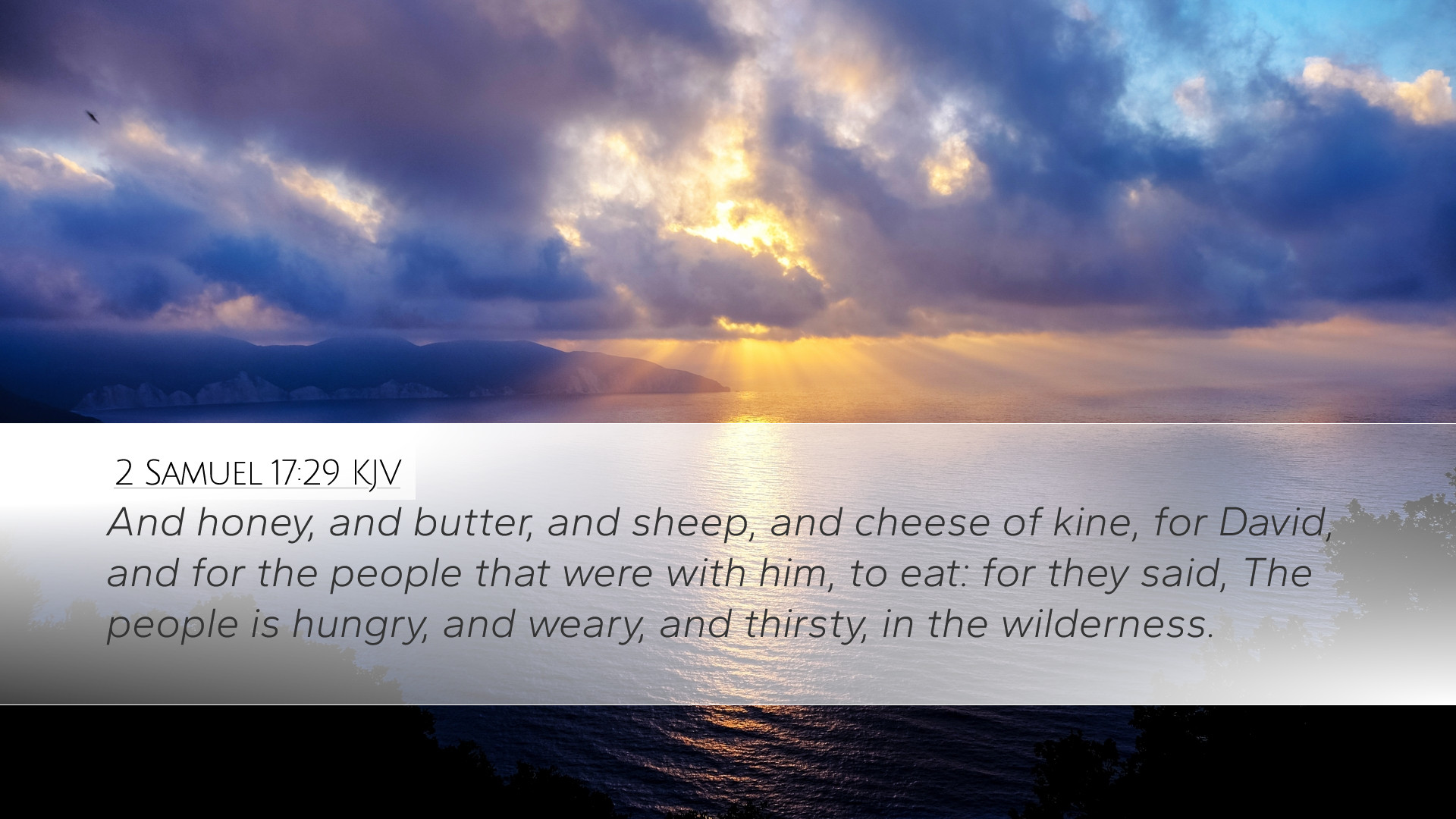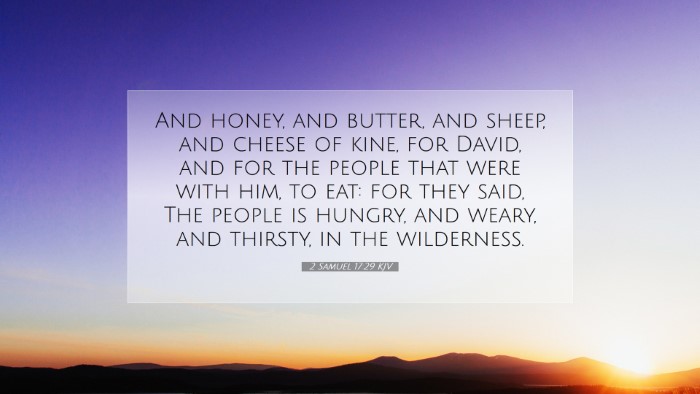Commentary on 2 Samuel 17:29
Verse: "And honey, and butter, and sheep, and cheese of kine, for David, and for the people that were with him, to eat: for they said, The people is hungry, and weary, and thirsty, in the wilderness."
Contextual Background
This verse occurs in a significant period of turmoil during King David's reign. Following Absalom's rebellion, David has fled Jerusalem, and his loyal friends are seeking ways to support him and his followers. This narrative highlights the themes of loyalty, providence, and divine sustenance amid adversity.
Insights from Matthew Henry
Matthew Henry provides profound insights into the provisions brought to David and his men. He notes that the list of items meant for sustenance—honey, butter, sheep, and cheese—symbolizes rich nourishment. Henry emphasizes the importance of physical sustenance during tough times, illustrating God's provision for His people both in spiritual and physical aspects. He observes that, like David's men, believers often find themselves in a wilderness of trials where their spiritual and physical needs must be met.
The Symbolism of Nourishment
Each item represents God’s abundant provision for His people. Honey signifies sweetness and delight, suggesting the joy that God offers even in hardships. Butter, a product of labor, indicates both work and blessing, and sheep often symbolize sacrifice and the presence of God’s guidance. The cheese signifies nourishment from the abundance of the land.
Insights from Albert Barnes
Albert Barnes emphasizes the practical aspect of care expressed for David and his followers. He highlights the importance of community support in times of distress. Barnes points out that the people understood that their leader and his men were weary from battle and the relentless pursuit by Absalom. This act of providing food underscores a significant theological principle: the value of kindness and compassion during times of crisis.
Meeting Needs in Crisis
The mention of the people’s hunger, weariness, and thirst signifies the universal human condition. Barnes notes that the physical needs of individuals cannot be disregarded in spiritual endeavors. This verse illustrates that meeting immediate physical needs can open the door to deeper spiritual insights and growth.
Insights from Adam Clarke
Adam Clarke offers a deeper analysis of the specific foods mentioned. He provides cultural context, noting that these items, particularly honey and cheese, were considered luxury items in the biblical context. His commentary suggests that the provisions were not merely sustenance but also an expression of honor toward David, highlighting the respect and loyalty his followers had for him during his struggle.
The Necessity of Honor and Respect
Clarke points out that providing lavish sustenance reflects a heart of devotion and respect. David, in a vulnerable state, receives not just food but also the assurance of companionship and loyalty from his followers. This dynamic is crucial in understanding leadership and community within the body of Christ.
Theological Themes
- Divine Provision: God provides for His people even when they find themselves in dire circumstances.
- Community Support: The importance of supporting one another in times of need cannot be overstated.
- Physical and Spiritual Interconnection: The care for physical needs mirrors a deeper spiritual reality, wherein God meets the holistic needs of His people.
- Loyalty and Devotion: Expressing gratitude through practical means is an essential aspect of the believer's walk.
Practical Applications
For pastors and theologians, this verse serves as a reminder of the importance of caring for the physical needs of congregants. In ministry, it is crucial to recognize the connection between physical well-being and spiritual health. When leaders take steps to ensure the welfare of their community, they model Christ-centered leadership.
For students of the Bible, pondering on 2 Samuel 17:29 invites a reflection on how God meets human needs, both practically and spiritually. It asks students to consider how they can be agents of God’s provision in their communities and to reflect on their roles within their respective church families.
Overall, the commentary on this verse offers rich insights into God’s character as a provider and the importance of community in reflecting His love and care.


